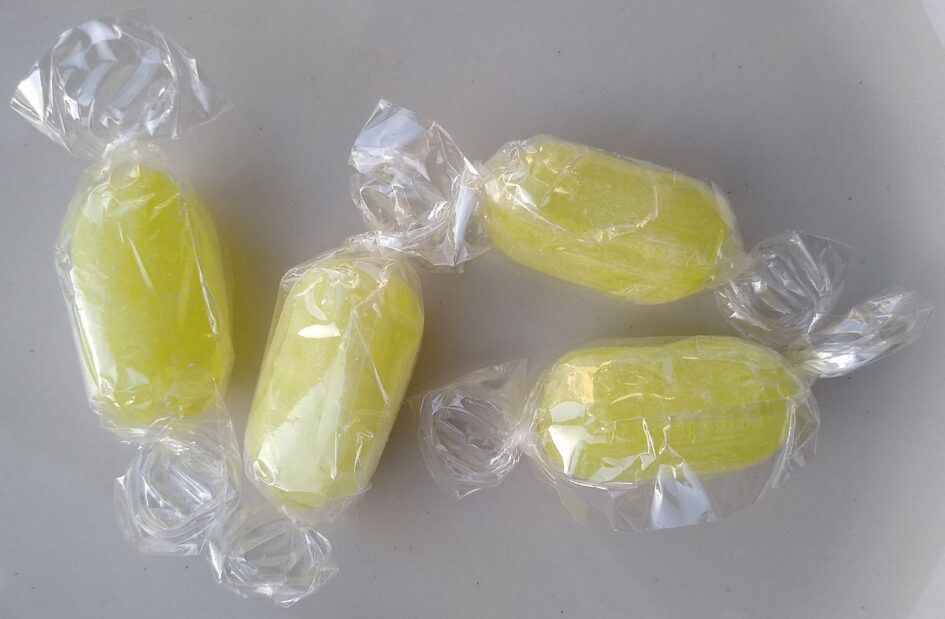One of our readers, Chen, reached out recently with questions about the translation of sherbet lemon (addressed in a previous post).
First: Chen pointed out that Dumbledore “unsticks” two sherbet lemons only moments after offering them to McGonagall, and wondered how this was handled in languages that translated it as a beverage or as ice cream. Here’s some of what I found, starting with Turkish as I did in the previous post:
“Limon şerbeti. Muggle’ların bir çeşit tatlı içeceği. Hoşuma gidiyor.” … Profesör McGonagall ürktü, ama o sırada iki limon şerbeti açan Dumbledore farkına varmadı bunun.
HARRY POTTER VE FELSEFE TAŞI (Ülkü Tamer, Turkish)
“Lemon şerbeti. It’s a kind of Muggle soft drink. I enjoy it.” … Professor McGonagall was startled, but Dumbledore didn’t notice it just then, opening two lemon juices.
The translator, Ülkü Tamer, indeed took into account that it doesn’t make much sense to “unstick” two soft drinks. Instead, Dumbledore opens the soft drinks. Other translations that made it into a drink tend to take this same approach. Take, for example, Isabel Fraga’s Portuguese:
“É uma bebida dos Muggles de eu gosto muito.” … A professora McGonagall vacilou, mas Dumbledore, que estava a abrir duas limonadas, pareceu não dar por isso.
HARRY POTTER E A PEDRA FILOSOFAL (Isabel Fraga, Portuguese)
”It’s a Muggle drink that I’m really fond of.” … Professor McGonagall hesitated, but Dumbledore, who was opening two lemonades, seemed oblivious.
I’m almost disappointed, honestly, that nobody decided to have Dumbledore pouring a drink instead of opening presumably prepackaged cans!
Take a look at what Amik Kasuroho does in Albanian after making sherbet lemon into lemon ice cream (akullore me limon):
Profesoresha MekGur u drodh, por Urtimori, që po i hiqte letrën akullores me limon, sikur nuk e vuri re.
HARRY POTTER DHE GURI FILOZOFAL (Amik Kasuroho, Albanian)
Professor McGurr shivered, but Urtimore, who was removing the packaging from the lemon ice cream, didn’t seem to notice.
The original Italian translation takes a similar approach:
La professoressa McGranitt trasali, ma Silente, che stava scartando un ghiacciolo al limone, sembrò non farvi caso.
HARRY POTTER E LA PIETRA FILOSOFALE (Marina Astrologo, Italian [2001])
Professor McGonagall started, but Dumbledore, who was unwrapping a lemon popsicle, seemed not to notice.
According to Chen, earlier editions of the Simplified Chinese translation (Su Nong and Cao Suling) had Dumbledore “unsticking” lemon ice cream popsicles (柠檬雪糕), but this was updated to lemon sherbet candy (柠檬雪宝糖).
Sherbet Balls

Second: Chen also noted that in Prisoner of Azkaban, Ron mentions “sherbet balls” that cause you to levitate as they fizz in your mouth:
“—and massive sherbet balls that make you levitate a few inches off the ground while sucking them,” said Ron.
HARRY POTTER AND THE SORCERER’S STONE (US)
The sherbet balls make another appearance later in the book when Harry shows up at Hogsmeade.
There were shelves upon shelves of the most succulent-looking sweets imaginable… there was a large barrel of Every Flavor Beans, and another of Fizzing Whizbees, the levitating sherbert balls that Ron had mentioned.
HARRY POTTER AND THE SORCERER’S STONE (US)
Simplified Chinese originally translated the two instances separately, the first time as an ice cream ball (冰糕球) and the second time as a fruity juice beverage (果子露饮料). In a later revision, the discrepancy was fixed, but they became a “fruit juice cream jelly” (果汁奶冻球).
I own only a few copies of Prisoner of Azkaban in other languages. I took a look and found that most of them caught connection between the two occurrences and translated them consistently. German, for example, calls them Bausekugeln in both instances. None of them connect the “sherbet balls” to the “sherbet lemons” in Philosopher’s Stone or Chamber of Secrets as the original English does.
Only one PoA translation I have access to appears to have neglected it: Faroese (Gunnar Hoydal).
“—og stórir limonadubollar, sum lyfta teg fimm sentimetrar uppfrá, tá tú sleikir teir.”
HARRY POTTER OG FANGIN ÚR AZKABAN (Gunnar Hoydal, Faroese)
“—and big lemonade balls, which lift you five centimeters high as you lick them.”
Note, by the way, the odd fact that sherbet balls are translated limonadubollar as if referencing the sherbet lemon in Philosopher’s Stone. Actually, Hoydal translates sherbet lemon as pulvursitrón (roughly meaning lemon sherbet). It’s unclear why Hoydal chose to change “sherbet” to “lemonade.”
Here’s how it’s referenced in Hogsmeade:
…tað slagið av bommum, sum Ron hevði tosað um, við sterkum pulvuri uttaná
HARRY POTTER OG FANGIN ÚR AZKABAN (Gunnar Hoydal, Faroese)
…the type of candy that Ron had talked about, with strong powder inside
We could assume this is referring to the limonadubollar, but there’s nothing in the text that connects it to Ron’s earlier mention.
As always, we love this sort of feedback. Thanks to Chen for sharing! If you have anything to add, or any questions to ask about Harry Potter, translation, or linguistics, feel free to write to us.

Leave a Reply